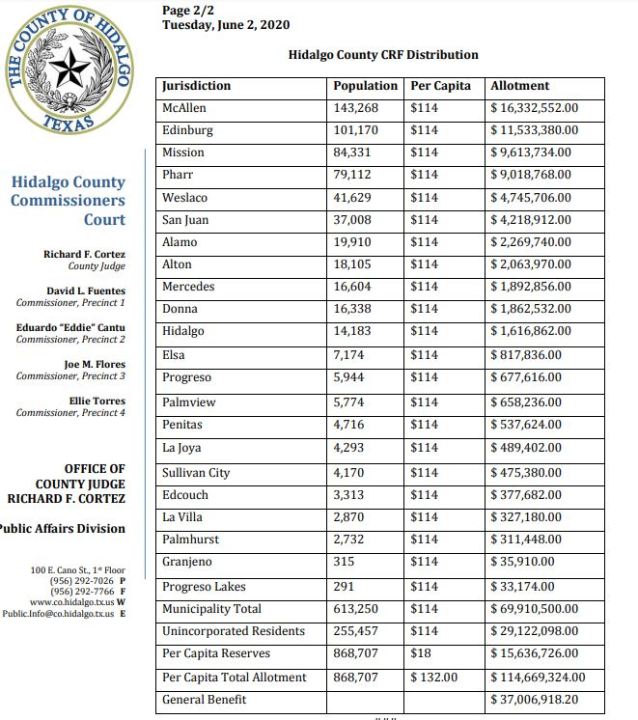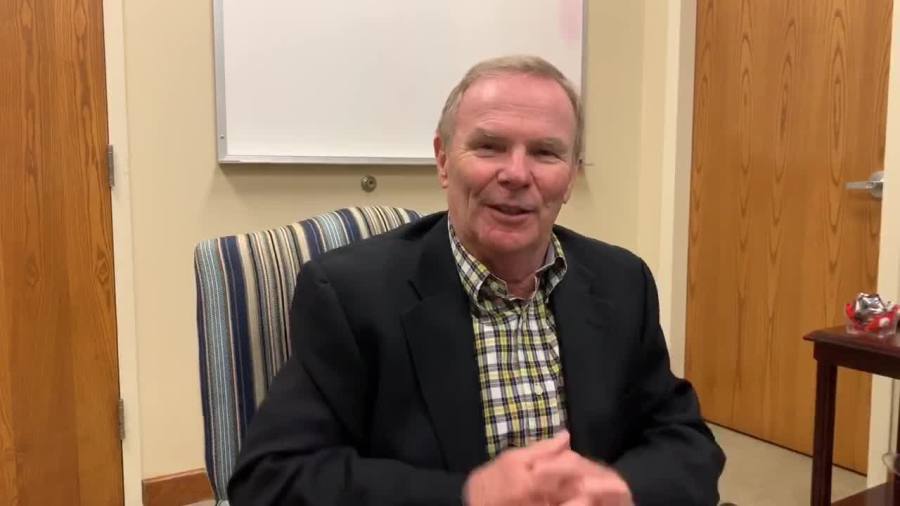The five-member Hidalgo County Commissioners’ Court voted unanimously on Tuesday afternoon to give $132 per capita to all cities and county residents from the $151 million the county received in April from the U.S. Department of Treasury from the CARES Act. But initially, the county will withhold 10% of the funds, or $18 per capita, “as
This is a little bump up for larger cities with populations over 30,000, which originally were slated to get $110 per capita; and a significant increase from just $80 per person for smaller cities. The court had come under fire from the 22 mayors after commissioners voted May 19 to give out these lesser amounts from the money the county received directly from the Coronavirus Aid, Relief, and Economic Security or CARES Act.
Hidalgo County is the only county in South Texas to receive funding directly from the federal government because its population is over 500,000. It was among only 12 counties and six cities in Texas to get direct federal funds. And the fight over money is not limited to this area, as many smaller cities and counties throughout the state are arguing for more relief aid, as an editorial in the Dallas Morning News this week explained.
Nevertheless, mayors here were furious when they felt they weren’t getting what they should.
On Thursday, mayors openly complained during an emergency meeting of the court held in Edinburg, Texas, arguing that they were perfectly capable of managing the money appropriately, and demanding the full $174.60 per capita that Congress had figured in its funding formula when it approved trillions of dollars in relief aid. Cortez, however, told them if he paid out at that rate there “would be zero dollars left for the county.”
Read a Border Report story on Thursday’s meeting.

After Tuesday’s meeting, Cortez told Border Report should no additional emergencies come up, that he expects to release the additional funds in September to the cities. But if the county or some city has an emergency, then that money will be redirected for whatever necessary financial aid.
“When I was negotiating with the mayors, I said, ‘Look, guys, I have a responsibility to address the needs of the cities during this emergency. Today, there are still unknowns of what may happen in the future, so, if I let go of all this money, I may not have money to respond to necessities that may occur in the future.’ So, I think it’s prudent for me to recommend we set aside 10% of the money,” Cortez said.
The county will keep the $42.60 per capita difference in funds — from $174.60 to $132 — Cortez said. These funds will reimburse county expenses, such as increasing the morgue, the Health Department, increasing jail capacity to social distance, testing materials and supplies
The largest city of McAllen, with a population of nearly 145,000, will get an initial allotment of $16.3 million and nearly $18 million total if there are no emergencies. The City of Edinburg, with 101,000 people will get $11.5 million up front after presenting qualifying documents, and the smallest city of Progreso Lakes with 291 people is eligible to immediately get $33,174.

U.S. Rep. Filemon Vela, a Democrat who represents eastern Hidalgo County, told Border Report that “in general this distribution seems fair in Hidalgo County” as long as “smaller towns are receiving the same dollar per capita as other cities.”

But McAllen Mayor Jim Darling, who is president of the Lower Rio Grande Valley Development Council, which is the regional council of governments, told Border Report he was “disappointed in not getting the $132 per capita” up front and “was disappointed originally relating to the $ 175 per capita that was original basis for the federal funding.”
But he added: “Having said that, I look forward to working with the county judge and all commissioners in addressing the needs of all of our citizens during these unprecedented times. I hope that they receive our input in the constructive manner in which it will be given.”
















